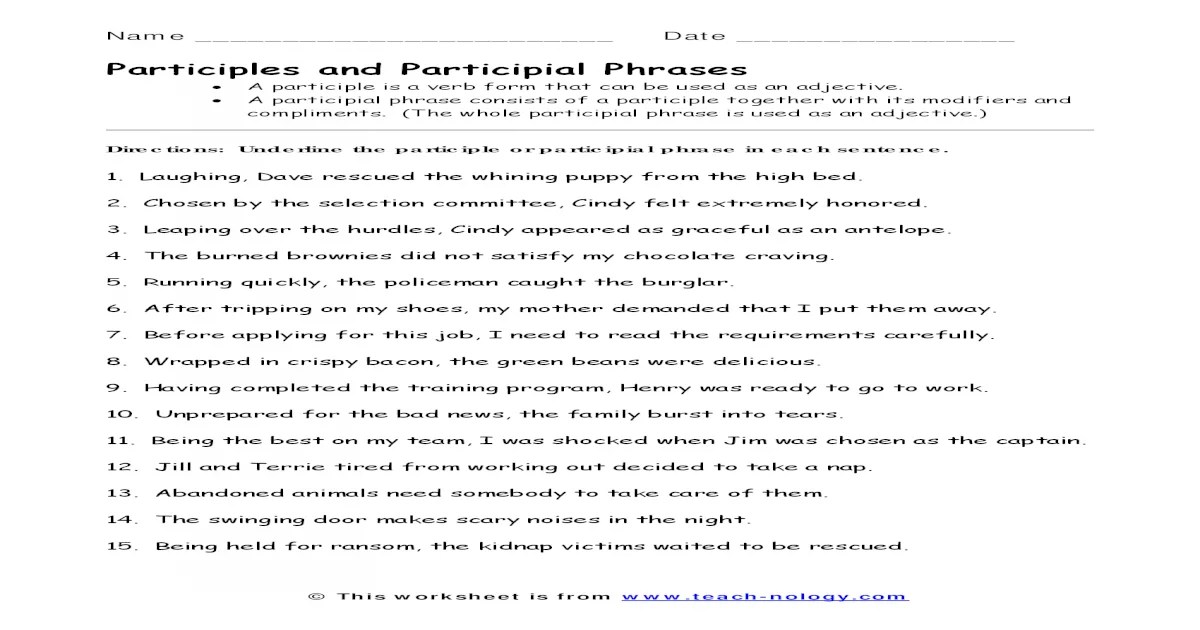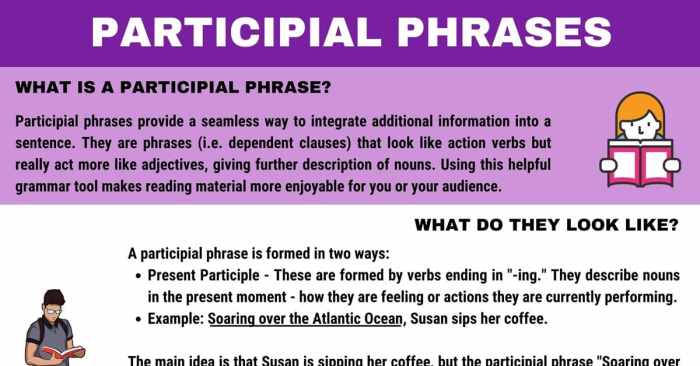Participles and participial phrases worksheet answer key – Welcome to our comprehensive guide to participles and participial phrases, where we delve into the intricacies of this grammatical construct. This worksheet answer key provides a thorough understanding of participles and their various forms, equipping you with the knowledge to use them effectively in your writing.
Participial phrases, often used to add detail and nuance to sentences, can transform your writing from ordinary to extraordinary. Whether you’re a student seeking clarification or a seasoned writer looking to refine your craft, this guide will serve as an invaluable resource.
Participles and Participial Phrases

Participles and participial phrases are grammatical constructions that can be used to add descriptive detail and variety to writing. A participle is a verb form that functions as an adjective, while a participial phrase is a group of words that includes a participle and any modifiers or objects.
Types of Participles
- Present participle:ends in -ingand indicates an ongoing action or state of being (e.g., running, talking)
- Past participle:ends in -edor -enand indicates a completed action or state of being (e.g., walked, written)
- Perfect participle:ends in having+ past participleand indicates an action or state of being that has been completed before another action (e.g., having walked, having written)
Participial Phrases
Participial phrases consist of a participle and any modifiers or objects that it may have. They can be used to provide additional information about a noun or pronoun in the sentence.
Examples:
- The boy running down the street
- The car parked in the driveway
- Having finished her homework, she went to bed.
Worksheet Answer Key: Participles And Participial Phrases Worksheet Answer Key

| Sentence | Participle | Type of Participle | Participial Phrase |
|---|---|---|---|
| The man walking down the street is my neighbor. | walking | Present participle | walking down the street |
| The broken window was replaced by a new one. | broken | Past participle | broken window |
| Having eaten dinner, we went to the movies. | having eaten | Perfect participle | Having eaten dinner |
Using Participles and Participial Phrases
Participles and participial phrases can be used in a variety of ways to enhance writing.
- Adjectival phrases:Participial phrases can be used to describe nouns or pronouns in the sentence.
- Adverbial phrases:Participial phrases can be used to modify verbs, adjectives, or other adverbs in the sentence.
- Introductory phrases:Participial phrases can be used to introduce a sentence or clause.
Tips for Using Participles and Participial Phrases, Participles and participial phrases worksheet answer key
- Make sure that the participle agrees in number and tense with the noun or pronoun it modifies.
- Avoid dangling modifiers, which occur when a participle phrase modifies a noun that is not clearly identified in the sentence.
- Use participial phrases sparingly to avoid making your writing choppy or confusing.
Additional Practice
Identify the participles and participial phrases in the following sentences:
- The man walking down the street is my neighbor.
- The broken window was replaced by a new one.
- Having eaten dinner, we went to the movies.
- The students, having studied hard, did well on the test.
- Running down the street, the boy tripped and fell.
Answer Key:
- Participle: walking; Participial phrase: walking down the street
- Participle: broken; Participial phrase: broken window
- Participle: having eaten; Participial phrase: Having eaten dinner
- Participle: having studied; Participial phrase: having studied hard
- Participle: running; Participial phrase: Running down the street
Write your own sentences using participles and participial phrases:
- The (adjective) man walked down the street.
- The (adjective) window was replaced by a new one.
- Having (verb) dinner, we went to the movies.
- The students, having (verb) hard, did well on the test.
- (Verb) down the street, the boy tripped and fell.
Answers to Common Questions
What are participles?
Participles are verb forms that can function as adjectives, describing nouns or pronouns.
How do I identify participial phrases?
Participial phrases consist of a participle and any modifiers or objects associated with it.
When should I use participial phrases?
Participial phrases are used to add detail, provide context, or modify nouns and pronouns in a sentence.